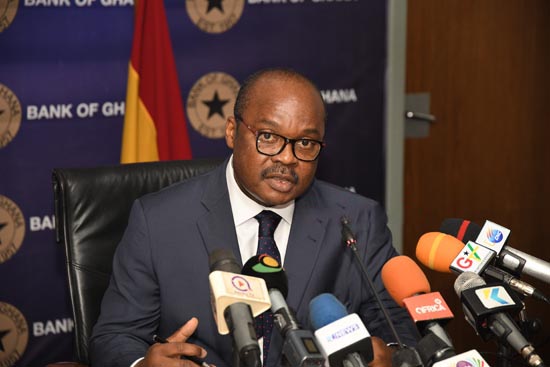Governor of the Bank of Ghana (BoG), Dr Ernest Addison, has said the GHS60.8billion loss reported was a technical loss arising from the haircut and the application of accounting standards to estimate expected credit losses over the tenor of the Government debt held by the Bank.
“It is not money lost by the Bank of Ghana through its operations in 2022,” he said.
Rather, he explained, one should look at this as a reflection of the total cost of the economic and social crisis the country faced over the years and an attempt to resolve a major structural problem of the Ghanaian economy.
“I must also add that, if one takes time to go through historical financial statements of the Bank of Ghana, you will realize that this is not the first time that the Bank has gone into negative equity.
“During the early years of structural adjustment, very large exchange rate depreciations led to revaluation losses that drove the Bank into negative Equity,” he said in a statement issued on Monday, August 21.
He further explained that anytime the economy faces major challenges, the Bank of Ghana’s balance sheet suffers, and the equity position moves into negative territories.
“You will recall that in 2017 and 2018, the Bank of Ghana incurred similar negative equity from the impairment of legacy liquidity support loans granted in 2015 and 2016 to insolvent banks, which our external auditors impaired due to the doubtful prospects of recovering from those insolvent banks. The Bank of Ghana however, recovered and generated profits throughout the period 2019 to 2021.
“It is worth noting that Central Banks are not commercial banks. Bank of Ghana’s current financial condition will not impact negatively on the operations of the Bank. The IMF technical assistance mission validated this conclusion before the necessary decisions were taken.
“In their opinion, the Bank of Ghana was policy solvent and would remain so, as it had enough income to cover monetary policy operational costs. The Bank of Ghana had sufficient capital amounting to about 15 per cent of its total liabilities. Its recommendation was for the Bank to retain all profits and a reassessment should be made in the year 2027. The Bank will also manage to reduce its operational costs during this period,” he explained.
The central bank earlier explained what led to the loss.
“As we all know, the Government of Ghana embarked on both domestic and external debt restructuring. The holdings of Government instruments and COCOBOD exposures were all part of the perimeter of the debt exchange. Whereas all other stakeholders that participated in the Domestic Debt Exchange (DDEP) did not have principal haircuts, but rather had new instruments with new tenors and coupon structure, the BoG, which served as the loss absorber to the entire debt exchange program, a key requirement that allowed the Government of Ghana to meet the threshold for the approval of the IMF programme.
“As a result, the BoG had to take on a 50 percent principal haircut on the total principal (which stood at GHC 64.5 billion at the time of the exchange),” the BoG said in a statement providing answers to frequently asked questions on the losses on Tuesday, August 1.
It added “Consequently, BoG had new instruments with extended tenor and significantly reduced coupon. By applying the full requirements of IFRS 9, this means that from the principal alone, a 50 percent haircut on the non-marketables amounted to a loss of GHC32.3 billion.
“The impairment from exposure to COCOBOD also amounted to GHC 4.7 billion. These three DDEP items (ie marketable, non-marketable and COCOBOD) accounted for GHC53.1 billion out of the total loss of GHC 60.8 billion for 2022. In addition to these three items, price and exchange rate valuation effects accounted for GHC 5.2 billion of the total loss, whereas interest expense on cost of monetary policy operation accounted for GH3.3 billion.”
Due to the impairment of the Government of Ghana’s securities holdings of ¢48.45 billion, impairment of loans and advances granted to quasi-government and financial institutions amounting to ¢6.12 billion and the depreciation of the local currency resulting in net exchange loss of ¢5.27 billion, the Bank of Ghana recorded GHS60.6billion loss in 2022.
The loss was occasioned by the Government of Ghana Domestic Debt Exchange Programme.
According to the BoG, its Board of Directors and Management assessed the policy solvency implications arising out of the negative net worth position and the group’s ability to continue to generate enough income to cover its monetary policy operations and other operational costs.
In the view of the directors, the Central Bank will continue to operate on a going concern basis due to a variety of factors underpinned by expectations of an improved macroeconomic situation and policy actions specifically targeted at improving its balance sheet.


